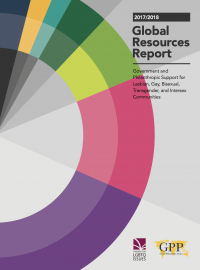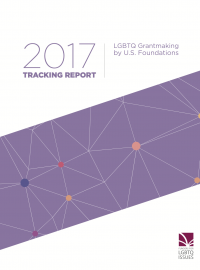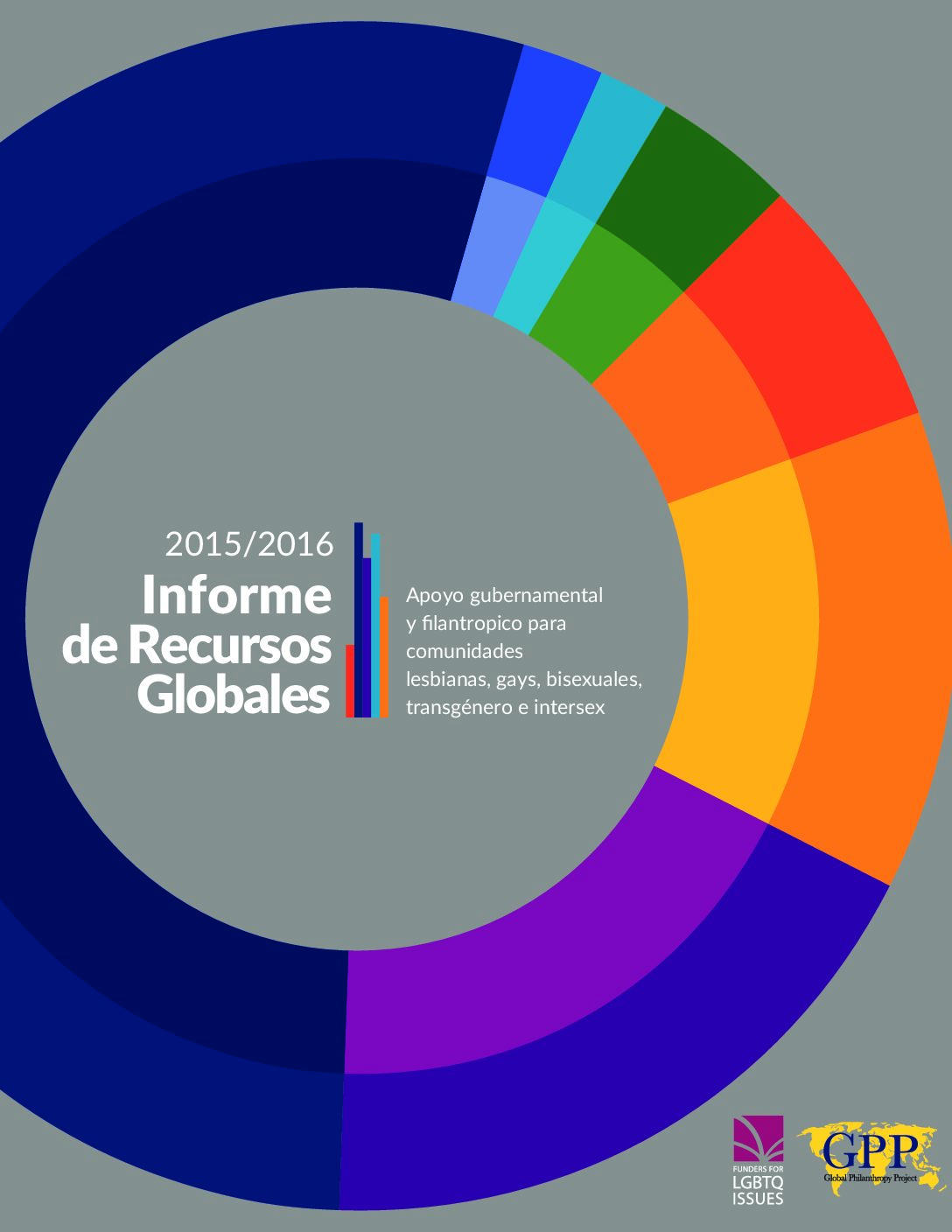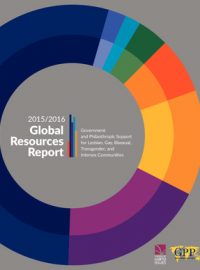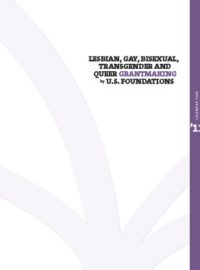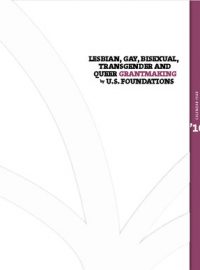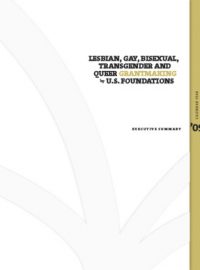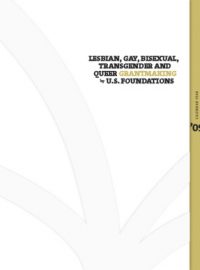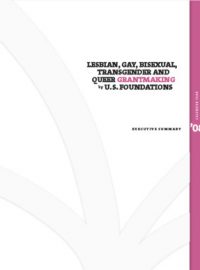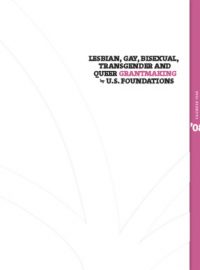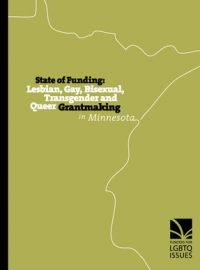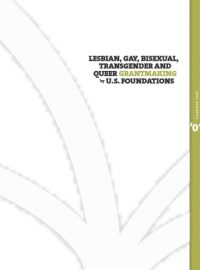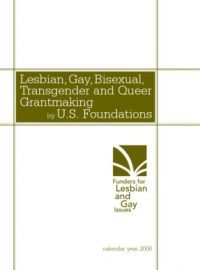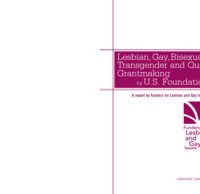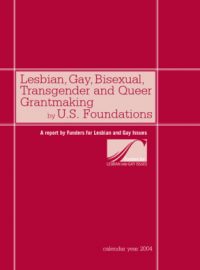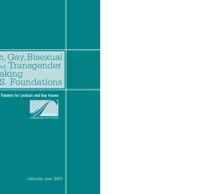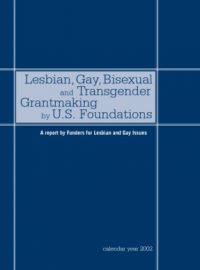Tracking Report
The 2021 Resource Tracking Report: Lesbian, Gay, Bisexual, Transgender, and Queer Grantmaking by U.S. Foundations (2023) explores the scope and character of U.S. foundation funding for LGBTQ communities and issues in calendar year 2021. This 19th edition of the tracking report represents the next iteration of work from Funders for LGBTQ Issues in our ongoing effort to document the scale of philanthropic support for LGBTQ communities and issues.
Our research finds that foundation funding reached a new high of $251 million in 2021. However, this does not tell the full story, as the most vulnerable members of the LGBTQ community did not necessarily see this benefit. Funding to transgender, gender nonconforming, and nonbinary communities, Black LGBTQ communities, and Southeastern LGBTQ communities has not increased commensurate with total LGBTQ funding. As a sector, we also continue to see an increase in overall foundation funding, meaning that even at this new high, for every $100 awarded by U.S. foundations in 2021, only 28 cents specifically supported LGBTQ communities and issues.
Highlights from the report include:
- The funding landscape for U.S. LGBTQ communities and issues grows increasingly top-heavy. The top ten funders accounted for over 60 percent of this funding, and the top twenty funders accounted for more than 70 percent.
- Nominal giving to trans communities only slightly increased from 2020, and remains lower than the record high in 2019. Foundations allocated less than 4 cents per $100 of their total giving to U.S. trans communities and issues.
- Grantmakers appear to continue to deprioritize funding for capacity-building efforts by LGBTQ organizations across the U.S. Given the unprecedented challenges in recent years facing the LGBTQ community on multiple fronts, it is clear that winning and defending the rights of intersectional LGBTQ communities requires building long-term, sustainable movement organizations and coalitions. Funding for capacity-building is key to support these long-term strategies.
- Funding to Black LGBTQ communities slightly decreased from 2020 to 2021, both in terms of dollars and as a share of overall LGBTQ funding.
- The U.S. Territories and the Mountain and Midwest regions continue to lag far behind in receiving funding support compared to the U.S. mainland coastal areas. This is especially concerning given rising extremism and violence towards BIPOC LGBTQ communities, drag performers, trans and gender expansive communities and youth, families seeking affirming health care, and their intersections, in some of these regions.
- The 2021 Resource Tracking Report: Lesbian, Gay, Bisexual, Transgender, and Queer Grantmaking by U.S. Foundations (2023) explores the scope and character of U.S. foundation funding for LGBTQ communities and issues in calendar year 2021. This 19th edition of the tracking report represents the next iteration of work from Funders for LGBTQ Issues in our ongoing effort to document the scale of philanthropic support for LGBTQ communities and issues. Our research finds that foundation funding reached a new high of $251 million in 2021. However, this does not tell the full story, as the most vulnerable members of the LGBTQ community […]
- Le Rapport sur les Ressources mondiales de 2017-2018 est désormais disponible en français ! Nous publions des données mondiales sur les enjeux LGBTI pour la période comprise entre 2017 et 2018 par région, par population, par enjeu, par stratégie et plus. Sumérjase en los datos de financiación LGBTI de 800 fundaciones y de 15 gobiernos otorgantes de fondos y agencias multilaterales. El Informe de Recursos Globales 2017-2018 hace públicos seis años de información exhaustiva con respecto a la financiación LGBTI. This translation of The Global Resources Report series is produced in partnership with the Global Philanthropy Project. For a version […]
- El Informe de Recursos Globales 2017-2018 ya está disponible en español! Publicamos datos sobre el financiamiento LGBTI a nivel global correspondientes al bienio 2017-2018 y organizados por regiones, grupos demográficos, temáticas, estrategias y más. Sumérjase en los datos de financiación LGBTI de 800 fundaciones y de 15 gobiernos otorgantes de fondos y agencias multilaterales. El Informe de Recursos Globales 2017-2018 hace públicos seis años de información exhaustiva con respecto al financiamiento LGBTI. This translation of The Global Resources Report series is produced in partnership with the Global Philanthropy Project. For a version of the 2017-2018 Global Resources Report in English, […]
- The 2017–2018 Global Resources Report builds on two previous editions, which focused on grantmaking in the calendar years 2013–2014 and 2015–16. With this third edition, we have now documented comprehensive data through six calendar years of grantmaking, allowing us to conduct a deeper analysis of LGBTI funding trend lines over time. The report documents over 19,764 grants awarded by 800 foundations, NGO intermediary funders, and corporations and by 15 donor government and multilateral agencies over the two-year period of 2017-2018. The report provides detailed data on the distribution of LGBTI funding by geography, issue, strategy, and population focus, offering a […]
- Funders for LGBTQ Issues y Global Philanthropy Project se complacen en presentar el Informe de Recursos Globales: Apoyo gubernamental y filantrópico para comunidades lesbianas, gays, bisexuales, transgénero e intersex de 2015-2016, un informe completo del estado del financiamiento que proveen las fundaciones y los gobiernos para los asuntos de las comunidades lesbianas, gays, bisexuales, transgénero e intersex (LGBTI). Este informe contiene datos de 12,964 donaciones otorgadas a 511 fundaciones, intermediarios y corporaciones, así como de 15 gobiernos y agencias multilaterales en un periodo de dos años, del 2015 y 2016. El informe brinda datos detallados sobre la distribución de fondos […]
- Funders for LGBTQ Issues and Global Philanthropy Project are pleased to present the 2015-2016 Global Resources Report: Philanthropic & Government Support for Lesbian, Gay, Bisexual, Transgender, and Intersex Communities, a comprehensive report on the state of foundation and government funding for lesbian, gay, bisexual, transgender, and intersex (LGBTI) issues. This report captures data on 12,964 grants awarded by 511 foundations, intermediaries, and corporations and by 15 government and multilateral agencies over the two-year period of 2015-2016. It provides detailed data on the distribution of LGBTI funding by geography, issue, strategy, and population focus, offering a tool for identifying trends, gaps, and opportunities in the rapidly changing landscape of LGBTI […]
- The 2016 Tracking Report (2018) explores the scope and character of foundation funding for LGBTQ issues in the calendar year 2016. The report analyzes 6,032 grants from 348 foundations, making it the most comprehensive assessment of LGBTQ funding available. The year 2016 brought with it a historic milestone: LGBTQ grantmaking surpassed $200 million for the first time ever. At $202.3 million, we exceeded our strategic goal of $200 million in foundation funding for LGBTQ issues by 2017. However, given the story behind this milestone, it is cause for neither celebration nor declaration of victory. The sharp rise in LGBTQ funding in 2016 […]
- The 2015 Tracking Report (2017) explores the scope and character of foundation funding for LGBTQ issues in the calendar year 2015. The report analyzes 5,267 grants from 334 foundations, making it the most comprehensive assessment of LGBTQ funding available. In 2015, funding for LGBTQ issues reached a record high of $160.7 million. The report notes significant increases in funding for trans communities, grantmaking to address criminalization and criminal justice reform, and support for LGBTQ communities in the U.S. South. The report finds the overall field of LGBTQ philanthropy widening slightly to include a larger number of funders. However, growth slowed to less […]
- The 2014 Tracking Report (2016) explores the scope and character of foundation funding for LGBTQ issues in the calendar year 2014. The report analyzes 4,552 grants from 313 foundations, making it the most comprehensiveness assessment of LGBTQ funding available. In 2013, funding for LGBTQ issues reached a record high of $153.2 million. In particular, there were significant increases in HIV/AIDS funding, support for the U.S. South, and grantmaking benefiting trans communities. However, there are an unfortunate number of sobering statistics behind the promising headlines. Despite our most sophisticated survey of philanthropic entities to date, the report finds that not since […]
- The 2013 Tracking Report (2014) explores the scope and character of foundation funding for LGBTQ issues in the calendar year 2013. The report analyzes 4,146 grants from 331 foundations, making it the most comprehensiveness assessment of LGBTQ funding available. In 2013, funding for LGBTQ issues reached a record high of $129.1 million.
- The 2012 Tracking Report (2012) is the most comprehensive study of its kind, capturing data on 4,068 grants awarded by 399 foundations in order to identify gaps, trends, and opportunities in LGBTQ philanthropy. This year’s report finds that domestic foundation funding for LGBTQ issues exceeded $100 million for the first time while overall LGBTQ funding was largely stable in 2012.
- U.S. foundation giving to LGBTQ communities and issues grew significantly in 2011, from $97.2 million to $123 million, an increase of 27%. Particularly high levels of growth were found for international organizations and for transgender communities. For the first time, funding to LGBTQ communities surpassed a quarter of a percent of all foundation grantmaking, but still remains fairly modest at only 0.26%.
- Our report on U.S. foundation funding to LGBTQ communities in calendar year 2010.
- The executive summary of our report on funding to LGBTQ communities in calendar year 2009.
- A report measuring the amount and character of funding by U.S. foundations to lesbian, gay, bisexual, transgender and queer communities in calendar year 2009.
- The executive summary of our report on grants to LGBTQ communities in 2008.
- A report measuring the amount and character of funding by U.S. foundations to lesbian, gay, bisexual, transgender and queer communities in 2008.
- An investigative report on the effects of the economic downturn on LGBTQ organizations and their funders.A research report on foundation giving and organizations in Minnesota that explicitly address lesbian, gay, bisexual, transgender and queer (LGBTQ) communities. Co-produced by the LGBT Funders Network of the Minnesota Council on Foundations.
- A report measuring the amount and character of funding by U.S. foundations to lesbian, gay, bisexual, transgender and queer communities in 2007.
- A comprehensive portrait of LGBTQ grantmaking by U.S. foundations.
- A comprehensive portrait of LGBTQ grantmaking by U.S. foundations.
- Highlights a number of issues facing LGBTQ communities, as well as existing organizing efforts among LGBTQ groups that effectively address racial and economic justice matters.
- A comprehensive portrait of LGBTQ grantmaking by U.S. foundations.
- A comprehensive portrait of LGBTQ grantmaking by U.S. foundations.

